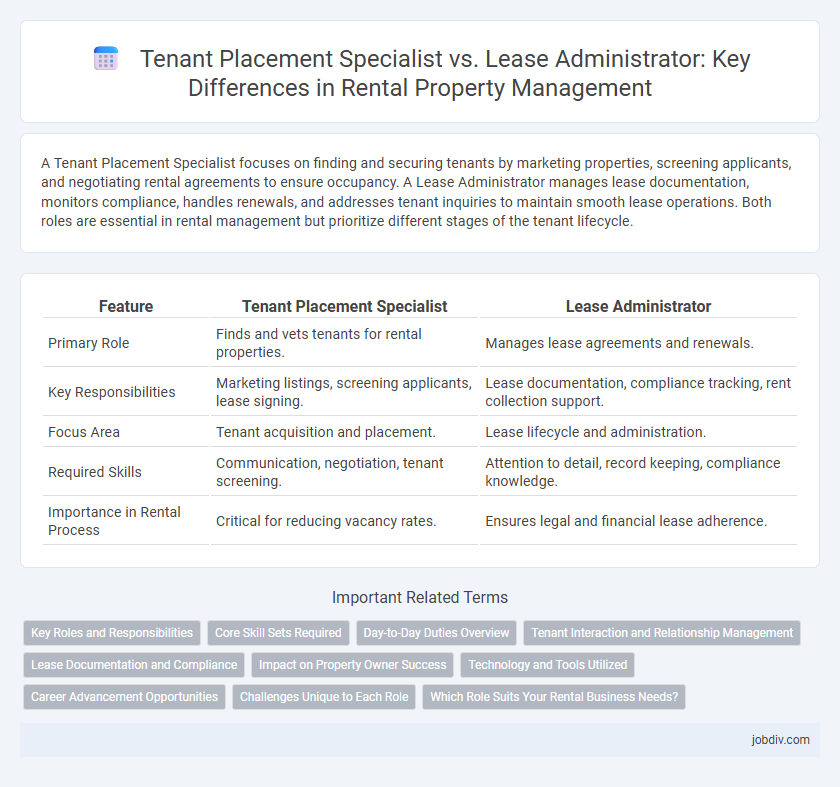A Tenant Placement Specialist focuses on finding and securing tenants by marketing properties, screening applicants, and negotiating rental agreements to ensure occupancy. A Lease Administrator manages lease documentation, monitors compliance, handles renewals, and addresses tenant inquiries to maintain smooth lease operations. Both roles are essential in rental management but prioritize different stages of the tenant lifecycle.
Table of Comparison
| Feature | Tenant Placement Specialist | Lease Administrator |
|---|---|---|
| Primary Role | Finds and vets tenants for rental properties. | Manages lease agreements and renewals. |
| Key Responsibilities | Marketing listings, screening applicants, lease signing. | Lease documentation, compliance tracking, rent collection support. |
| Focus Area | Tenant acquisition and placement. | Lease lifecycle and administration. |
| Required Skills | Communication, negotiation, tenant screening. | Attention to detail, record keeping, compliance knowledge. |
| Importance in Rental Process | Critical for reducing vacancy rates. | Ensures legal and financial lease adherence. |
Key Roles and Responsibilities
Tenant Placement Specialists focus on matching prospective tenants with suitable rental properties by conducting market analyses, showing units, and negotiating lease terms. Lease Administrators manage lease documentation, ensure compliance with rental agreements, track lease renewals, and coordinate tenant communications throughout the lease term. Both roles are essential in optimizing property occupancy and maintaining efficient rental operations.
Core Skill Sets Required
Tenant Placement Specialists excel in client relations, negotiation, and market analysis to match tenants with appropriate rental properties efficiently. Lease Administrators require strong organizational skills, attention to detail, and expertise in lease document management and compliance tracking. Both roles demand proficiency in communication and knowledge of local rental laws but differ in their primary focus on tenant acquisition versus lease lifecycle management.
Day-to-Day Duties Overview
Tenant Placement Specialists focus on marketing rental properties, screening potential tenants, and coordinating property showings to ensure a smooth leasing process. Lease Administrators manage lease documentation, track lease expirations, and handle tenant communications related to renewals and compliance. Both roles collaborate to maximize occupancy rates and maintain accurate records throughout the lease lifecycle.
Tenant Interaction and Relationship Management
Tenant Placement Specialists focus on tenant interaction by actively sourcing and matching prospective tenants with suitable rental properties, ensuring a smooth move-in process and addressing initial client inquiries promptly. Lease Administrators manage ongoing tenant relationships by handling lease documentation, renewals, and compliance issues, maintaining clear communication to resolve disputes and facilitate lease terminations. Both roles are critical for tenant satisfaction, with the specialist emphasizing acquisition and onboarding while the administrator prioritizes lease lifecycle management.
Lease Documentation and Compliance
Tenant Placement Specialists focus on finding qualified tenants and preparing initial lease agreements, ensuring accurate lease documentation aligns with tenant requirements. Lease Administrators manage ongoing lease compliance, oversee amendments, renewals, and ensure adherence to regulatory and contractual obligations throughout the lease term. Effective collaboration between both roles enhances lease accuracy and legal compliance in rental property management.
Impact on Property Owner Success
Tenant Placement Specialists drive property owner success by securing qualified tenants quickly, minimizing vacancy periods, and maximizing rental income through effective marketing and screening. Lease Administrators ensure long-term success by managing lease compliance, renewals, and tenant relations, reducing legal risks and ensuring consistent cash flow. Both roles synergize to enhance overall property performance and owner profitability.
Technology and Tools Utilized
Tenant Placement Specialists leverage customer relationship management (CRM) software and digital marketing platforms to attract and screen potential tenants efficiently. Lease Administrators utilize property management systems (PMS) and document management tools to handle lease agreements, track compliance, and automate rent collection. Both roles benefit from integrated communication tools but differ in their primary technology focus--tenant acquisition versus lease lifecycle management.
Career Advancement Opportunities
Tenant Placement Specialists gain career advancement by developing expert skills in tenant sourcing, leasing negotiation, and market analysis, positioning themselves for roles in property management or real estate brokerage. Lease Administrators advance by mastering lease documentation, compliance, and contract management, which can lead to senior administrative, legal coordination, or portfolio management positions. Both career paths offer growth potential within the rental industry, depending on focus areas like client interaction or regulatory expertise.
Challenges Unique to Each Role
Tenant Placement Specialists face challenges such as matching renters with suitable properties while navigating fluctuating market demands and maintaining high occupancy rates. Lease Administrators encounter complexities in meticulously managing lease agreements, ensuring compliance with legal regulations, and handling renewals or terminations efficiently. Both roles require specialized skills to address tenant satisfaction and operational accuracy within the rental industry.
Which Role Suits Your Rental Business Needs?
A Tenant Placement Specialist excels in marketing rental properties and screening potential tenants to ensure high occupancy rates, making them ideal for businesses focused on rapid tenant acquisition. Lease Administrators handle lease agreements, renewals, and compliance, providing essential support for maintaining tenant relationships and legal accuracy. Choosing between these roles depends on whether your rental business prioritizes attracting new tenants or efficiently managing existing leases.
Tenant Placement Specialist vs Lease Administrator Infographic

 jobdiv.com
jobdiv.com